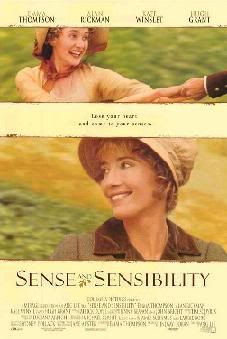|
Saturday, March 24, 2007
Sense & Sensibility
Title: Sense & Sensibility
Author: Jane Austen

“Elinor, this eldest daughter whose advice was so effectual, possessed a strength of understanding, and coolness of judgment, which qualified her, though only nineteen, to be the counselor of her mother. She had an excellent heart – her disposition was affectionate, and her feelings were strong; but she knew how to govern them.
Marianne abilities were, in many respects, quite equal to Elinor’s. She was sensible and clever, but eager in everything; her sorrows, her joys, could have no moderation. She was generous, amiable, interesting; she was everything but prudent.”
Prepare yourself, readers, for I have something dreadful to relate. Two weeks ago, I read Jane Austen’s Sense & Sensibility for the very first time. Scandalous, I know. Please, have a seat if you’re feeling faint. Would a glass of wine relieve your distress? If not, I’ll have the maid fetch some salts. While you’re recovering, however, shall I tell you something of what I’ve read? It’s wonderfully amusing.
The story begins when Mr. Dashwood, the owner of a large and extensive estate, dies. The property is entailed, and thus passes to his son by a former marriage, leaving his widow and their three daughters – Elinor, Marianne, and Margaret – comparatively destitute.
The Dashwood women withdraw from their former home, soon finding themselves established in a modest country cottage. But before this, the eminently practical Elinor falls in love with a Mr. Edward Ferrars, the brother of her sister-in-law. Edward’s a rather diffident, dull bloke, but he suits Elinor marvelously well and seems to return her partiality.
Unfortunately, Edward’s been secretly engaged for years to Lucy Steele. Lucy is of a rather sly character, and Edward no longer respects or admires her. Still, he’s determined to honor the engagement out of a sense of duty. He doesn’t reveal the situation to Elinor, whom he truly loves. Rather, he simply leaves when called away by his family, who fear he’s becoming too attached to the impoverished Elinor. They think he should be aspiring to far loftier connections.
Meanwhile, the romantic and impulsive Marianna is chasing a rainbow one day when she falls down a hill and sprains her ankle. Along comes the dashing Mr. Willoughby, who sweeps her up in his arms and carries her home. Before long, they’re apparently in love as well. But, like Edward before him, Willoughby has a secret, and he leaves suddenly one day without explanation. Everyone, however, assumes he and Marianne are secretly engaged and that it’s only a matter of time before the wedding.
And thus the stage is set for one of English literature’s great romances. Can Elinor and Edward ever be together, as they both wish? Why won’t Willoughby answer Marianne’s letters? What about poor Colonel Brandon, who has a tragic past and a hopeless passion for the much younger Marianne? And is it better, after all, to love with the head or the heart…or both?
If you’ve seen the movie starring Emma Thompson and Kate Winslet, it all plays out pretty much as expected…only better! There’s a delicious scene where Willoughby unexpectedly arrives at the house where Marianne lays ill, begging to see her. And the interaction between Elinor and Lucy is…oh, perfectly bitchy in the best way possible. It’s far cattier than in the movie. They never openly speak hostile words, yet both know they’re rivals for the same man’s affection. And because they’re women, this means that they pretend to be best friends. You’d expect a row to break out at any minute, except that Elinor is far too elegant for that ever to occur.
Speaking of Elinor, I liked her character immensely. Her sensible approach to her predicament, once she learns of Edward’s engagement, keeps the novel grounded in reality. She doesn’t weep and beat her breast, but quietly and resolutely determines that no one will ever know of her suffering. Poor girl, what else could she do?
But this is Jane Austen, so everything ends happily in marriage. Hope that doesn’t ruin it for you.
I honestly can’t comprehend how it is that I didn’t read Sense & Sensibility until now. It’s the only Austen I’ve thus neglected. I’d begun it on several occasions, but something always called me away. Either I was too overwhelmed with work, or some other story was calling me more urgently.
But once I began this time, I was engrossed. In fact, I’m almost glad it took me 10 years to read it. I’ve been an Austen fan ever since I was 15, and the experience of having a “new” Jane Austen to read after all this time was…well, just about one of the best book experiences I’ve ever had. Maybe 25 was the best age for me to read this at, and inexplicable lapses like this one happen for a reason. It’s possible.Labels: Austen, romance of the non-trashy variety
posted by Elizabeth at
11:25 PM

0 Comments:
|
|

